Five Questions for Men Who Want to Be Better Allies
 One of the great privileges of my life is being a practicing aspiring ally to women, girls, LGBQ, trans, and gender non-conforming folks. I learned about aspiring allyship long before it was a buzzword. Back in the early 90s, I was involved in antiracism work in upstate New York. I was speaking quite frequently with a white male colleague named Mike. He and I would go to the same events and say virtually the same thing, but he would reach the hearts of white folks in a different way than I could. I spoke to them, but he moved them.
One of the great privileges of my life is being a practicing aspiring ally to women, girls, LGBQ, trans, and gender non-conforming folks. I learned about aspiring allyship long before it was a buzzword. Back in the early 90s, I was involved in antiracism work in upstate New York. I was speaking quite frequently with a white male colleague named Mike. He and I would go to the same events and say virtually the same thing, but he would reach the hearts of white folks in a different way than I could. I spoke to them, but he moved them.
It was powerful to see how two people can have the same information, the same analysis, but because one was valued more and perceived to be more relatable to the audience, the information was received in a much more meaningful way.
At that same time, some incredibly wise women in my community challenged me. They said, we see how you are showing up for antiracism work, but what about your sexism? That question changed the course of my life. Just like Mike had tremendous influence in doing antiracism work with white folks, I had a powerful platform to do antisexism work with other men. That realization started my more than 30-year journey which has been uncomfortable, rewarding, challenging, joyful, and sometimes real difficult, but always worth it.
Whether you have been practicing aspiring allyship for as long as I have, or you are just getting started, I have five questions for you to consider that will help further your journey.

1. Are you an ally to women you know or to all women?
We know we should care about our moms, wives, partners, sisters, and daughters. But do we really care—are we interested in—the lives of ALL women. For example, are you an aspiring ally to a financially poor, immigrant woman who doesn’t speak English fluently?
Our work at A Call To Men seeks to address intersectional oppression at its roots. We intentionally look to those “at the margins of the margins” to articulate their own lived experience and help define solutions that will be effective in their lives. When we center our attention and efforts on those “at the margins of the margins,” it’s our belief that everyone will benefit. If you want your aspiring allyship to make the greatest impact possible, advocate for those in the margins. Equity and justice for those who are less oppressed are sure to follow.
2. How do you use your privilege to elevate the voices of people in the margins?
People in the margins are all too often unheard. They are silenced. They are made invisible. But you can help bring them into the light. You can use your privilege to elevate their stories. Rather than talking about how you’ve seen sexism or racism play out, let those who are most affected share their stories. You can be their access point. You can be their megaphone. You can create opportunities for them.
3. How do you practice aspiring allyship every day?
Aspiring allyship is a practice. There is no graduation—no certificate of completion. It’s a commitment to never look away from what you now know. It’s a promise to remain teachable. It’s a vow to invite leadership from Black, brown, and Indigenous folks. It’s a pledge to bring others into this work. It requires constant self-reflection, acknowledgment of your mistakes, and a deep desire to keep pushing forward even when it’s uncomfortable. Brene’ Brown recently said: “I’m here to get it right, not to be right.” That’s the perfect mantra for aspiring allyship.
4. Where can you be a productive – not performative – practicing aspiring ally?
It’s easy to throw up a snappy quote about equity, a #BlackLivesMatter graphic, or Pride flag on your social media channels. That’s step one. How can you follow up on that declaration in your real life?
Are you in a position of authority at work? Can you advocate for equal pay for female-identified, Black, brown, LGBQ, trans, and gender non-conforming colleagues? Maybe you can increase the intentionality around who is chosen to participate in the summer intern program. I bet you can call out a brilliant idea from a colleague who is often overlooked.
Are you in a position of influence in your community? Do people listen to you? Can you share anti-sexist or anti-racist messages within in your organization, book club, place of worship, or educational institution? Can you highlight speakers or organizations doing good work?
Do you interact with young people? Can young people be their whole, authentic selves with you, and be met with love and respect and support?
5. Can you financially support these causes?
Organizations working to promote equity and equality need your financial support. I know things are tight, but if you can, donate to support this critical work.
It is our job to show up, to listen, and to take what we learn and incorporate it into our practice of aspiring allyship. I do hope you will join me.